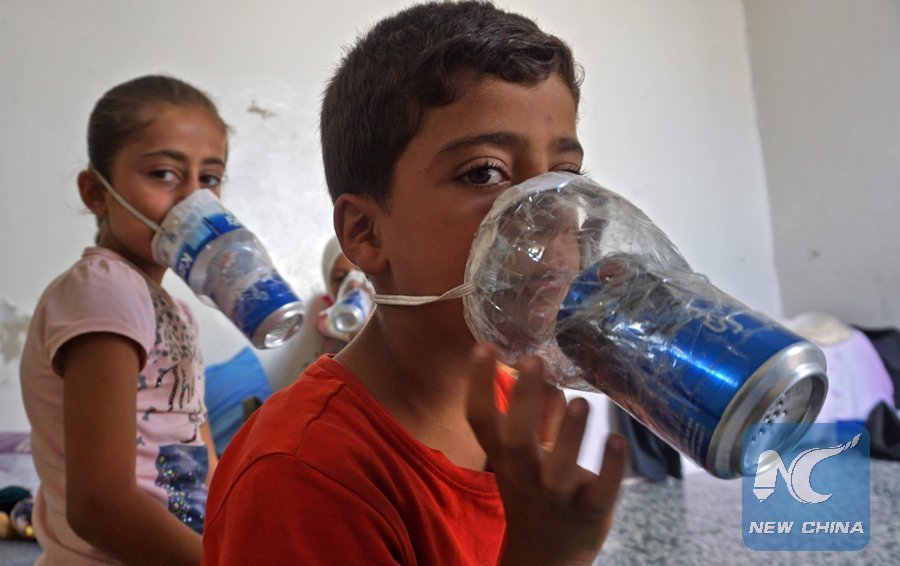
Children try improvised gas masks in their home in Binnish in Syria's rebel-held northern Idlib province as part of preparations for any upcoming raids on Sept. 12, 2018. (Xinhua/ AFP)
UNITED NATIONS, Sept. 11 (Xinhua) -- As a seemingly imminent full-scale offensive on Syria's Idlib province looms, the United Nations (UN) Security Council on Tuesday remained deeply divided, prompting a no-escalation plea from Secretary-General Antonio Guterres.
At a council meeting on the situation in Idlib, the last major rebel stronghold in Syria, U.S. ambassador to the UN Nikki Haley issued a stern warning on the Syrian government, Russia and Iran over military operations in the northwestern province.
"We consider any assault on Idlib to be a reckless escalation of the conflict. If (Syrian President Bashar) Assad, Russia, and Iran continue down the path they are on, the consequences will be dire. The world will hold them responsible," she told the council.
Russian and Syrian government air forces have launched over 100 airstrikes in Idlib this month, she noted.
Haley said last week's trilateral summit in Tehran involving Russia, Iran and Turkey "has failed to stop the violence or to promote a political solution" to the Syrian conflict.
Russia's UN ambassador Vassily Nebenzia argued at the same meeting that there is a need to fight terrorism in Idlib.
"We cannot allow terrorists to hold hostage and use hundreds of thousands of people as human shields," he said. "It is unacceptable to spare terrorists."
He warned against Western military intervention in Syria under what he said was the "pretext" of chemical weapons use.
"The use of chemical weapons by Damascus, from a military point of view, cannot be justified ... because doing this will be an invitation to the Western troika (of the United States, France and Britain) to strike Syria -- and that is exactly what they are threatening, using the pretext of chemical weapons use," Nebenzia said.
Iran's UN ambassador Gholamali Khoshroo said a "clear and strong message" of the Tehran summit is that the presidents of the three countries are determined to "continue cooperation to eliminate all terrorists."
Feridun Sinirlioglu, Turkish ambassador to the UN, however, made it clear that his country is opposed to an assault on Idlib.
"The Syrian regime seeks to legitimize its operation on counter-terrorism grounds. Let us make no mistake: such an operation would not achieve the stated goal," he said.
Whether to launch an offensive on Idlib was a major point of divergence at the Tehran summit, with Russia and Iran urging the military operation while Turkey, which backs some of the opposition groups in Idlib, opposing it.
"In a complex place like Idlib, traditional counter-terrorism methods would not yield the desired results. On the contrary, they would create further suffering, alienate and radicalize more Syrians. In this sense, a military operation in Idlib would only play into the hands of terrorists," he said.
British ambassador to the UN Karen Pierce said her country strongly agrees with Turkish President Recep Tayyip Erdogan, who claims in an op-ed in Tuesday's Wall Street Journal that Assad's solution to countering terrorism is a false one.
She said the international community faced a choice between letting go of an assault by Russia and Assad's government -- which may result in "thousands" of civilian deaths and "the barbarian use of chemical weapons" -- and providing support for Turkey and the opposition to let them "separate out the terrorists."
Chinese ambassador to the UN Ma Zhaoxu said China welcomed the outcome of the Tehran summit and commended Russia, Iran and Turkey for their efforts to push for a diplomatic solution to the Syrian issue.
"There is no alternative to a political settlement if Syria were to achieve peace and stability," he said.
Ma said Syria's sovereignty, independence, unity and territorial integrity must be respected and that the international community should form synergy to continue to fight terrorism in Syria.
He also asked the international community to leverage the role of the UN as the principal mediator and support the UN-led Geneva talks and the Astana process in the auspices of Russia, Iran and Turkey.
UN Secretary-General Guterres said after the Security Council meeting that it is "absolutely essential" to avoid a full-scale attack on Idlib.
A full-scale attack would unleash a humanitarian nightmare unlike any seen in the blood-soaked Syrian conflict, he told reporters.
Idlib is home to some 1.4 million Syrian refugees fleeing conflicts elsewhere in the country, constituting nearly half of the province's population and including nearly 1 million children.
Their lives have been upended and they have nowhere to go, Guterres said. "Idlib is the last so-called 'de-escalation zone' in Syria. It must not be transformed into a blood bath."
"I understand that the present situation in Idlib is not sustainable and the presence of terrorist groups cannot be tolerated. But fighting terrorism does not absolve warring parties of their core obligations under international law," he added.
The secretary-general said Russia, Iran and Turkey "bear a particular responsibility" for finding a way to isolate terrorist groups and protect civilians. He also warned against the use of chemical weapons, saying it is totally unacceptable and "would lead to a situation spiraling out of control."
Meanwhile, he urged greater progress in the UN-led Geneva peace process, particularly the creation of a constitutional committee as part of the overall political package.
"There is no military solution to the conflict. The solution must be political," Guterres said.

